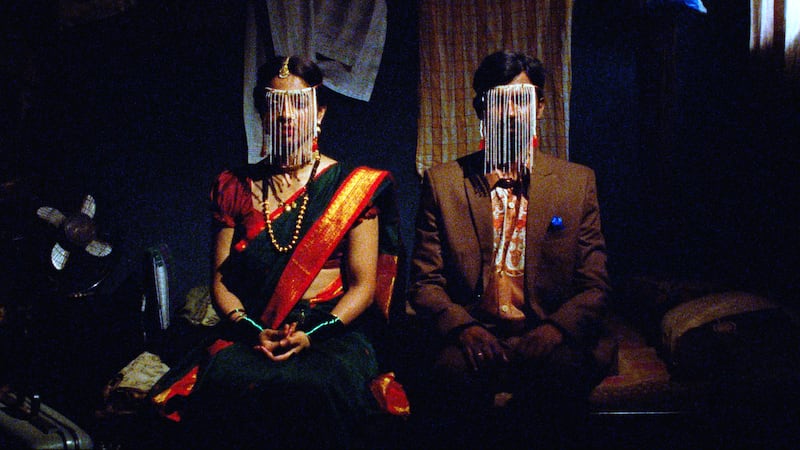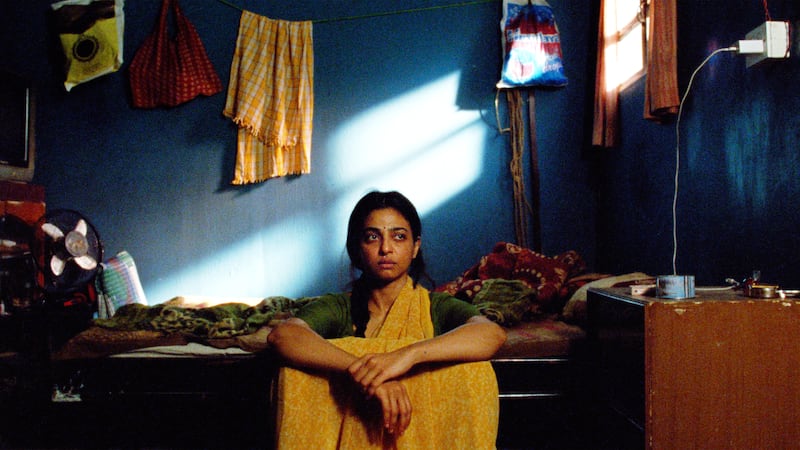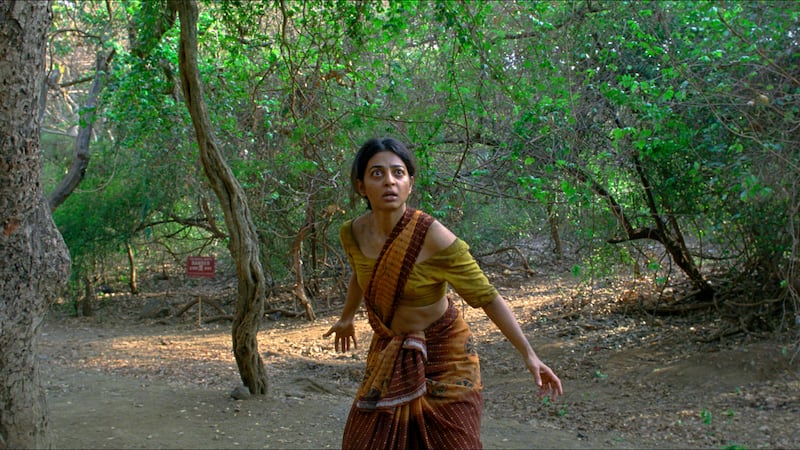Marriage can drive you mad—literally, in the case of Uma (Radhika Apte), whose arranged union to a man she barely knows sends her into a crazy spiral of sickness, violence, and carnivorous chaos.
A delightfully zonked marital satire that lurches in various demented directions, Karan Kandhari’s film, which hits theaters May 15, straddles cultures, genres, and tones with ease, spearheaded by a fantastic performance from its leading lady. It may not congeal into something completely coherent, but then, that appears to be precisely the point of this haywire black comedy.
Sitting beside her new husband Gopal (Ashok Pathak), who’s slumped over sleeping (an immediate hint about his dullness), Uma stares out a train window onto approaching Mumbai with a look of forlorn resignation tinged with modest hope. Alas, the latter is quickly dashed by the reality of her situation. Residing in a cramped one-room shack connected to identical dwellings, Uma is expected, without any acclimation period or training, to spend her days tending to matronly duties while her spouse earns a meager living.
The problem is that Uma doesn’t know how to be a wife, and to cope with her cluelessness, she asks her neighbor Sheetal (Chhaya Kadam, previously seen in All We Imagine as Light) to teach her how to cook rice so she can at least provide a meal for Gopal when he returns home in the evening.
In its static images, droll camera pans, and jaunty editing (courtesy of Napoleon Stratogiannakis), Kandhari’s film proves indebted to the work of Wes Anderson, and that influence extends to a diverse soundtrack that melds original compositions (by Paul Banks), traditional Indian tunes, and rock ‘n’ roll and country tracks by The Band, The Stooges, Howlin’ Wolf, and Motörhead.

Sister Midnight‘s eclecticism is part and parcel of its punky spirit, here embodied by Uma, whose misery in this foreign environment escalates at a rapid pace. Sleeping with her back turned to Gopal, and rarely speaking to him, she begins raging against her imprisonment, stealing money and storming out so she can buy crackers that she munches on while sitting on public steps, and chopping up vegetables for dinner with ferocious clumsiness.
Before long, her hostility—born from abandonment, purposelessness, and a lack of warmth and intimacy—can’t be contained, with Uma outright calling her hubby “motherf---er” and “a big buffalo,” and disregarding his complaints that she has ”a filthy mouth.”
Uma’s melancholy manifests itself physically via loss of appetite and regular puking that’s dissimilar from the bouts of hungover vomiting suffered by Gopal, who occasionally stays out having drinks with his coworkers. Frustrated, Uma demands to go somewhere, and Gopal relents by taking her to the beach—the problem being that it’s a 13-hour bus ride each way, leaving them with virtually no time to enjoy their destination.
A subsequent trip to the wedding of Gopal’s cousin is even less pleasant, with a nearby guest muttering behind their backs that they’re “village idiots” who are together simply because “every girl rejected him. And she’s just insane.” A match made in heaven this is not, and in the aftermath of this disastrous outing, their fighting grows more heated, with Gopal musing, “Why can’t you just be like other people?”

Uma responds to her unhappiness by getting a janitorial job at a shipping company, and Sister Midnight repeatedly follows her as she walks to and from her place of employment, mop and bucket in hand and a sullen snarl on her face. No matter where she seeks refuge, however, she finds little relief from her depression, and if the film’s early passages are a bit redundant, they’re nonetheless wryly framed and energized by Apte, whose predominantly silent performance is a model of angry and exasperated expressiveness.
Save for a few stolen moments with kindred women (“That’s friendship. Being able to sit together in silence”), gender expectations are inescapable, and they gradually twist and warp Uma’s mind, culminating with an encounter with a baby goat in an alley that goes horribly wrong—and, then, totally bonkers.
After this incident, Sister Midnight takes a slow, inexorable dive off the deep end, as Uma begins partaking in behavior that might generously be labeled “unhinged” and which she keeps secret from her spouse, who eventually remarks that something “stinks” in their cramped dwelling.
Kandhari’s story comes to involve birds, rodents, and a gaggle of goats that, no matter the circumstances, won’t stay dead, and the writer/director’s use of stop-motion animation to bring these unreal creatures to life is witty and evocative. Whether they’re a figment of Uma’s imagination or a sign of supernatural forces at play is never explicitly elucidated, in large part because the film assumes its protagonist’s wonky POV. And the material’s haziness keeps things spry even when Uma winds up trapped in her house with a corpse she apparently hopes will be liberated through rebirth.
From long, slow zooms through interior spaces toward Uma (often seen in doorways), to aerial shots that spy her amidst crowds on public streets and sidewalks, Sister Midnight occasionally veers into ’70s-era aesthetics, and its surprising hodgepodge of styles and tones carries through to its later action.

Holed up inside her residence, Uma discovers that others view her as a witch, and if Kandhari underlines a bit too boldly that she’s the victim of a patriarchal community which demands that women accept their roles as docile servants, he dramatizes it amusingly and unpredictably. Despite the clear nature of her plight, Uma’s odyssey is a rambling and rollicking one, and Apte is so funny—skillfully balancing cartoonishness and poignancy—that the character becomes a captivating comic creation.
Renewal takes many forms in Sister Midnight, be it via small acts of rebellion (like giving away a couple’s dog to a random kid), violent murder, or a new sarong and matching lipstick.
No matter its flights of fancy, Kandhari’s film remains a grounded critique of Indian social norms and demands. Still, its out-there mania is the key to its humorous success, aided, in no small part, by an Apte turn that should earn her bigger and better opportunities in the near future—including, one can only hope, a choice role in a future Wes Anderson effort.









